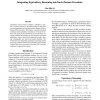20 search results - page 4 / 4 » Cryptographic Hardness Results for Learning Intersections of... |
AAAI
2000
13 years 6 months ago
2000
Equivalency clauses (Xors or modulo 2 arithmetics) represent a common structure in the SAT-encoding of many hard real-world problems and constitute a major obstacle to DavisPutnam...
ASIACRYPT
2011
Springer
12 years 5 months ago
2011
Springer
A cryptographic assumption is the (unproven) mathematical statement that a certain computational problem (e.g. factoring integers) is computationally hard. The leakage-resilience l...
ML
1998
ACM
13 years 4 months ago
1998
ACM
It is well known that prior knowledge or bias can speed up learning, at least in theory. It has proved di cult to make constructive use of prior knowledge, so that approximately c...
ACNS
2004
Springer
13 years 10 months ago
2004
Springer
Abstract. We study the setting in which a user stores encrypted documents (e.g. e-mails) on an untrusted server. In order to retrieve documents satisfying a certain search criterio...
CRYPTO
2011
Springer
12 years 5 months ago
2011
Springer
We present a somewhat homomorphic encryption scheme that is both very simple to describe and analyze, and whose security (quantumly) reduces to the worst-case hardness of problems ...


